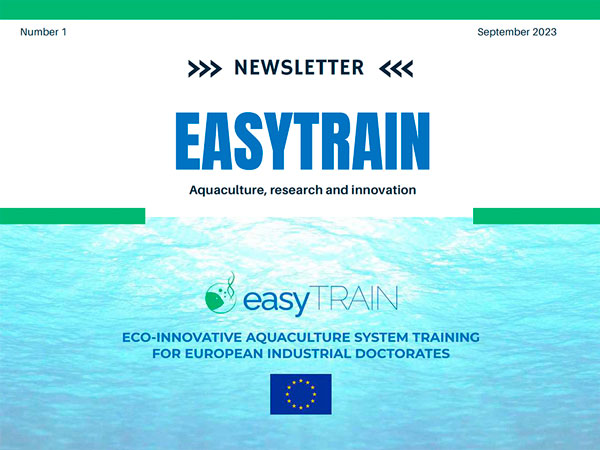News
Latest news about EASYTRAIN.
29-09-2023
European Science Night 2023
On the 29th of September 2023, the annual European Researchers' Night, Europe's largest science communication and promotion event, took place in 27 countries, aiming to showcase the diversity of European research and innovation and their impact on citizens' daily lives.
Our own Early Stage Researcher Sarah Perché recently had the privilege of representing the #easyTrain program at the #European Science Night, also known as La Noche Europea de los Investigadores, in the University of Murcia.
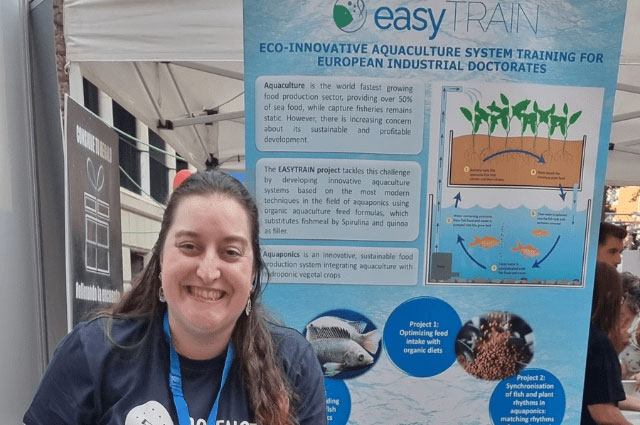
Funded under the EU's Marie Skłodowska-Curie actions (MSCA), this remarkable scientific initiative creates unique occasions each year to demonstrate in constructive ways how European research is vital for our future and welfare. During the event, the important role of European research is highlighted notably in combating climate change, achieving the sustainable development goals and promoting healthier environment and lifestyles for European citizens.
This event brings together students, PhD candidates, post-docs, and researchers to share their research and scientific knowledge with a wide audience, including young people. Children, youngsters and families will have the chance to get to know researchers' work through entertaining and educational activities such as science shows, games, quizzes, competitions, exhibitions, and digital activities.
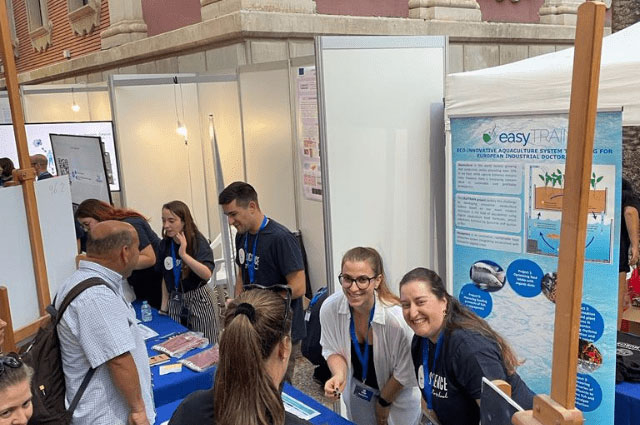
Within the framework of easyTrain, Sarah Perché took the opportunity to educate everyone about aquaponics systems and their significance, by spreading scientific knowledge related to aquaculture to a broader community.
#PhD # Marie Skłodowska-Curie #EasyTrain #ScienceOutreach #AquaponicsEducation #ResearchCommunity
23-09-2023
Joint day of 3 EU ITN projects on Aquaculture in Vienna 2023
Aquaculture is the farming of aquatic animals, such as fish, shellfish, and algae, and ensuring the sustainable development of these practices, minimizing their environmental and social impacts is of utmost importance for ensuring global food security. Therefore, sustainable aquaculture is essential for meeting the growing global demand for seafood while protecting the environment.
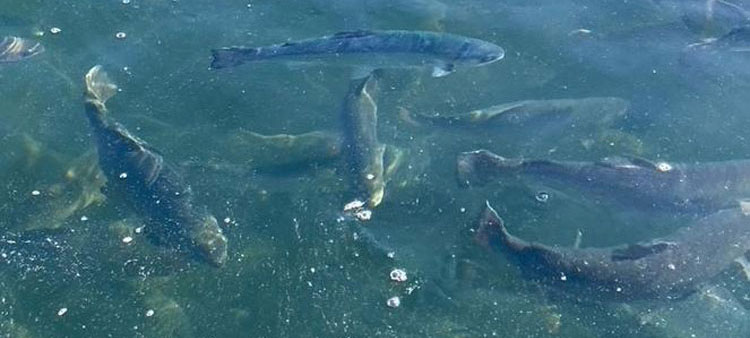
Marie Skłodowska-Curie Actions (MSCA) consortiums RASOPTA, EATFISH, and EASYTRAIN held a joint event on September 22nd in Vienna, Austria. The event brought together Ph.D. students and researchers to discuss their work on different aspects of research and development on sustainable aquaculture practices. These consortiums are funded by the European Union's Horizon 2020 research and innovation program. Together, they join 33 students from all over the world, working in top-class universities and research centers around Europe.
The RASOPTA consortium, led by Copenhagen University, in Denmark, is working to develop new technologies and practices for sustainable recirculating aquaculture systems (RAS). RAS systems are closed-loop systems that recycle water and nutrients, making them much more environmentally friendly than traditional open-net aquaculture systems.
The EATFISH consortium, led by Wageningen University, in the Netherlands, integrates the biological, technical, political, and socio-economic aspects of aquaculture, which are essential for optimizing these practices and enhancing their economic and environmental sustainability.
The EASYTRAIN consortium, led by Murcia University, in Spain is developing innovative aquaculture systems based on modern techniques, by bringing together industrial partners with expertise in the fields of feed production, aquaculture engineering and biotechnology.

The day brought intense discussions on many aspects of aquaculture productions and increased the contact and network between the projects. The connection between industry and science is of utmost importance for bringing the sector forwards and with the interaction between these three projects the network across Europe has been significantly increased. The plan is to have another joint day at the Aquaculture Europe/World conference which will be held in Copenhagen in August 2024.
Another notable moment was the participation of Sarah Perché at the 2023 European Aquaculture Society (EAS). Sarah's journey during the conference was a memorable one and it included a lot of interesting stages.
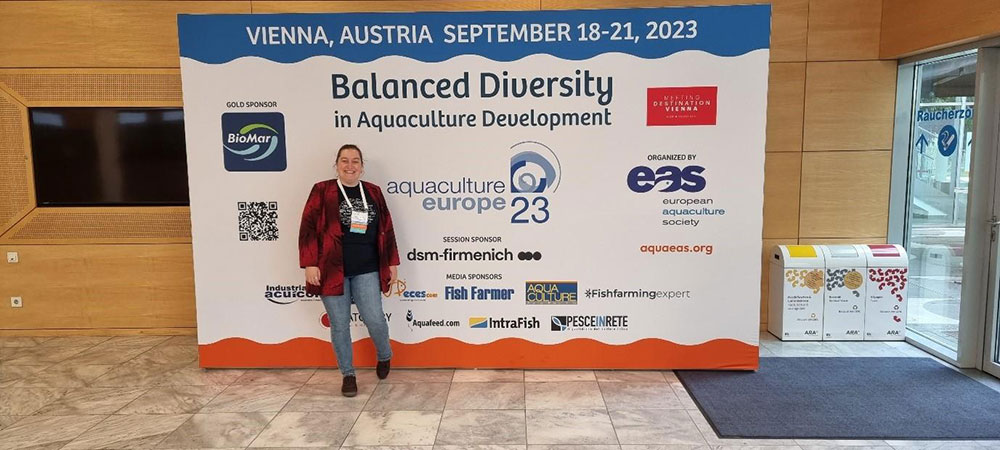
- Volunteering and Reception: Sarah began by volunteering at the conference reception, connecting
with attendees and fellow volunteers.
- Trade Show Involvement: She delved into the aquaculture industry, assisting at the Landing
Aquaculture booth, where she networked and explored the latest industry advancements.
- Engagement and Networking: Sarah attended informative presentations, broadening her knowledge
and establishing valuable connections with peers who shared her passion.
- Razzmatazz Session: A standout moment was her participation in the first-ever EAS Razzmatazz session, where she presented under a 5-minute timeframe, blending science with music and a relaxed atmosphere.
In a nutshell, Sarah's EAS 2023 experience was a dynamic blend of learning, networking, and innovation, leaving a profound impact on her journey in the aquaculture sector.
22-09-2023
2023 European Aquaculture Society (EAS)
Aquaculture is the world's most diverse farming practice in terms of number of species, farming methods, intensity level and environments used. Since global aquaculture production is dominated by a few dozen species, significant efforts have been made to promote species diversity. For these reasons, the focus in the annual EAS meeting was diversification, with a variety of parallel sessions, featuring speakers covering a broad range of scientific disciplines and cultivated species.
The four-day event took place in Austria's capital, Vienna from 18-21 September and succeeded in covering the full scope and diversity of European aquaculture. EAS 2023 was dedicated to new innovations on the theme of balancing diversity within aquaculture and the wider blue economy. Several presentations and pitches from multiple speakers from different platforms, academia and industry, offered to the aquaculture stakeholders the chance to share their initiatives and knowledge, in order to encourage collaboration within the European aquaculture sector.
During the event, an international trade exhibition was held, while certain industry forums, student sessions and activities, satellite workshops, and updates on EU research have been intensively covered.
A highlight moment was the active participation of our very own ESR Sara Perché in EAS 2023.
Sarah Perché's journey at the 2023 European Aquaculture Society (EAS) conference had definetely been a memorable one:
- Volunteering and Reception: Sarah began by volunteering at the conference reception, connecting
with attendees and fellow volunteers.
- Trade Show Involvement: She delved into the aquaculture industry, assisting at the Landing
Aquaculture booth, where she networked and explored the latest industry advancements.
- Engagement and Networking: Sarah attended informative presentations, broadening her knowledge
and establishing valuable connections with peers who shared her passion.
- Razzmatazz Session: A standout moment was her participation in the first-ever EAS Razzmatazz session, where she presented under a 5-minute timeframe, blending science with music and a relaxed atmosphere.
In short, Sarah's EAS 2023 experience was a dynamic blend of learning, networking, and innovation, leaving a profound impact on her journey in the aquaculture sector.
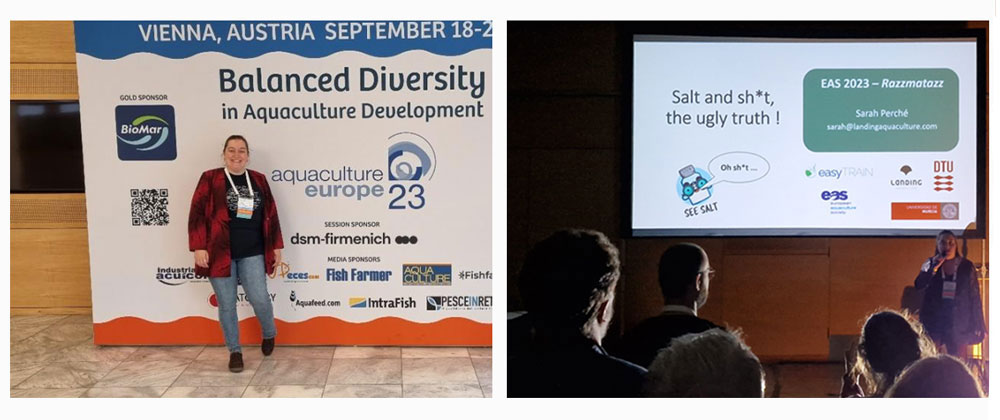
15-09-2023
NEWSLETTER easyTRAIN No. 1
Sara
Wastewater and sludge valorisation from recirculating aquaculture systems
To counter the fact that more than 2.2 billion tonnes of waste are produced every year in the European Union, a switch toward a circular economy is currently ongoing to extend the life cycle of products with the objectives to reduce and to create a value on waste. Recirculating aquaculture systems are already promoted as sustainable for intensive aquaculture systems for low footprint, low water use and controlled environment. However, it comes at a cost, one is the energy consumption and two the discharge regulations become stricter as facilities increase their production hence their waste. The valorisation of aquaculture waste becomes a major objective for the industries, as described by the CEO of Marineholmen RASLab (Norway). This article is giving value to my current research about the valorisation of marine aquaculture sludge from recirculated aquaculture systems.
https://www.innovationnewsnetwork.com/wastewater-and-sludge-valorisation-from-recirculating-aquaculture-systems/32465/
Essi
Expansion sees pioneering biotech company MiAlgae launch Omega-3 product, NaturAlgae
MiAlgae, a biotechnology company based in Scotland, has been able to launch a commercial manufacture of microalgae-derived Omega-3 product. By producing Omega-3 in microalgae it is possible to avoid exploiting the natural fish populations to obtain this essential fatty acid. In microalgae cultivation the company utilises co-products from whisky industry, thus promoting circular economy and the sustainability of the processes.
https://www.mialgae.com/news-database/launch-naturalgae
Santiago
Andalusian researchers identify a protein in the kidney of fish that measures their stress in captivity
A recent study conducted by Spanish researchers on meagre fish (Argyrosomus regius) has identified a specific renal protein that can be used as an indicator of both acute and chronic stress. This finding opens up opportunities for the development of non-invasive methods to assess and ensure the welfare of farmed fish.
https://www.mispeces.com/noticias/Investigadores-andaluces-identifican-una-proteina-del-rinon-de-los-peces-que-mide-su-estres-en-cautividad
Rodrigo
Why novel aquafeed ingredients are likely to remain niche for some time
Øyvind Fylling-Jensen, CEO of Nofima, a Norwegian food research institute, shedded light on the current state of novel aquafeed ingredients and their potential impact on aquaculture. He said that while these innovative ingredients offer promising benefits, they are expected to remain niche in the aquafeed sector for the foreseeable future. This limitation is primarily attributed to various factors, including challenges related to availability, cost, and regulatory compliance. These barriers pose significant hurdles to the widespread adoption of novel aquafeed ingredients, hindering their integration into mainstream aquaculture practices. As the industry continues to explore and address these challenges, it is anticipated that the utilization of such ingredients will gradually expand over time.
https://thefishsite.com/articles/why-novel-aquafeed-ingredients-are-likely-to-remain-niche-for-some-time-fylling-jensen-nofima
François
The global aquaponics market is projected to reach USD 2,294.48 million by 2030, growing at a CAGR of 13.0%. Aquaponics combines aquaculture and hydroponics to create a sustainable hybrid system that produces fish and plants in a controlled environment. The advantages of aquaponics include water usage efficiency, high yield, organic production, and resource optimization. The demand for aquaponics is driven by the increasing demand for food, limited resources, and the self-sufficiency of the system. Despite disruptions caused by the COVID-19 pandemic, aquaponics is gaining attention as an alternative farming technique, with installations in supermarkets and urban warehouses. The UN supports the installation of aquaponics systems in sensitive territories such as the Gaza stripe in order to support food security.
https://www.globenewswire.com/news-release/2023/07/03/2698397/0/en/Global-Aquaponics-Market-Report-2023-Increasing-Demand-for-Organic-Food-Across-the-Globe-Bolsters-Growth.html
MORE INFO: Click to donwload the NEWSLETTER easyTRAIN No. 1 PDF
01-09-2023
The time of the day matters
Santiago Pintos
This study, conducted at the University of Ferrara, sheds light on how stress-related behaviours vary according to the time of day in the zebrafish Danio rerio, a teleost model species. Authors explored how zebrafish respond behaviourally to stress events at different times of the day, subjecting them to a novel environment paradigm every 4 hours over a 24-hour cycle.
By assessing the behavioural performance of both isolated and grouped fish, the results supported the presence of circadian rhythmicity in well-reported zebrafish anxiety-like behaviours. However, it was discovered that not all behaviours showing daily variations were driven by stress. Specifically, the thigmotaxis behaviour emerged as a reliable stress indicator throughout the day, as confirmed by a control experiment.
Interestingly, the study also revealed that the impact of stress was more pronounced when the stressor occurred at night rather than during the day. This finding highlights the importance of considering the time of day when disturbing fish species. The implications of this research could be significant in refining manipulation protocols and enhancing fish welfare in aquaculture settings, where understanding chronobiological factors and aligning routine and maintenance activities with optimal times may prove beneficial.
17-04-2023
easyTRAIN Project Meeting and 3rd Training Module
From the 17th to the 21st of April, 2023 the University of Ferrara together with the University of Murcia organized in Ferrara (Italy) the 3rd Training Module on "Microalgae Biotechnology & Transversal skills" and the Project Meeting in the in the framework of easyTRAIN project.
In this course the 6 ESRs (early-stage researchers) participating in easyTRAIN project were trained in complementary skills such as proposals preparation and project management and dissemination and communication by the partner organisations BIOAZUL and WE&B respectively.
easyTRAIN project works on the development of an eco-innovative aquaculture system training for European industrial doctorates. In this context, 6 selected early stage researchers (ESRs) work on their aquaculture-related industrial doctorates hosted and supervised by easyTRAIN partners, and they are also trained on different transversal skills. One of these skills is project development and management.
MICROALGAE BIOTECHNOLOGY
Alga&Zyme Factory, an innovator in the field of microalgae biotechnology, is making significant strides in harnessing the power of microalgae for sustainable solutions, through research and development.. The company CEO and collaborators presented about the impact of research in the development of microalgae biotechnology. Other topics addressed were about the methods for harvesting and culturing microalgae. The team showcased innovative techniques and technologies that enhance productivity, optimize resource utilization, and ensure scalability, paving the way for large-scale microalgae production. ESRs were also given an opportunity to visit Alga&Zyme facilities. The immersive tour provided firsthand insights into the company's infrastructure.
- Session 1: Discovery and development in biotech- the microalgae case. Can research do it alone?
- Session 2: Methods for microalgae harvesting: forward osmosis for concentrating microalgae cultures.
- Session 3: Microalgae cultivation: a sustainable choice for an Italian clam hatchery.
TRAINING MODULES ON PROJECT PROPOSALS PREPARATION, MANAGEMENT AND RESULTS EXPLOITATION
BIOAZUL developed three training modules, focused on Horizon Europe project proposals preparation, Horizon Europe project management and project results exploitation strategies respectively. The main topics covered were:
Module 1, Horizon Europe proposals preparation.
- Session 1: Introduction to Horizon Europe programme, training on the Funding & Tenders portal use and preparation of part A of a project proposal.
- Session 2: Preparation of Excellence and Implementation sections of part B of a project proposal.
- Session 3: Preparation of Impact section of part B of a project proposal and budget development.
Module 2, Horizon Europe project management.
- Session 4: Participants register and validation, Grant Agreement preparation, Grant management.
- Session 5: Project monitoring and reporting, continuous reporting module, periodic reporting module.
Module 3, Project results exploitation strategy.
- Session 6: Key exploitable results, exploitation roadmap, useful tools.
- Session 7: Business plan development, SWOT analyses, business canvases.
This course has been an opportunity to continue advancing in our training activity in the preparation of proposals for European projects and in their subsequent management. For BIOAZUL it is a pleasure to be able to contribute to the training of the new generations of researchers and continue advancing in innovation together.
COMUNICATION TOOLS
We&B, another partner from the project, delivered an insightful presentation on the vital role of communication in the realm of science. With a focus on the ESRs, they highlighted the significance of effective communication through compelling use cases and engaging activities.
SUPERVISORY BOARD AND SUPERVISORS MEETING
During the final meeting of the training module, a collaborative gathering of project partners, as well as ESRs Francesca Conti and Rodrigo Mendes, took place. The purpose of this meeting was to assess the progress achieved thus far, delve into future project plans, and address any concerns or challenges raised by the ESRs. It was an opportunity to review and align efforts, ensuring the project's continued success and the professional growth of the participating researchers.
20-12-2022
Three new Partner Organisations have been added to the easyTRAIN project
Two Portuguese (CCMAR and UTAD) and one Finish (UTU) institutions are the new Partners.
The Algarve Centre of Marine Sciences (CCMAR) is one of the foremost marine science research centres in Portugal, gathering experts in the fields of marine biology, ecology, oceanography, environmental sciences, biotechnology, fisheries and aquaculture.
The University of Trás-os-Montes e Alto Douro (UTAD) is a Public Institution of Higher Education oriented towards the creation, transmission, and dissemination of culture, knowledge, science, and technology, through the articulation of study, teaching, research, and experimental development.
The University of Turku (UTU) is a scientifically strong, multidisciplinary university. The Molecular Plant Biology unit of UTU is focused on understanding the structure, function, and regulation of photosynthesis in plants, algae and cyanobacteria.
29-9-2022
Santiago Pintos (ESR5) was the winner of the Student Spotlight Award | EAS website
Santiago Pintos (ESR5) was the winner of the Student Spotlight Award, in the Aquaculture Europe 2022 conference. This prize is given by the European Aquaculture Society to showcase the talent of young European researchers.
25-10-2021
A technique from the past for raising fish and plants in the same space | La Verdad
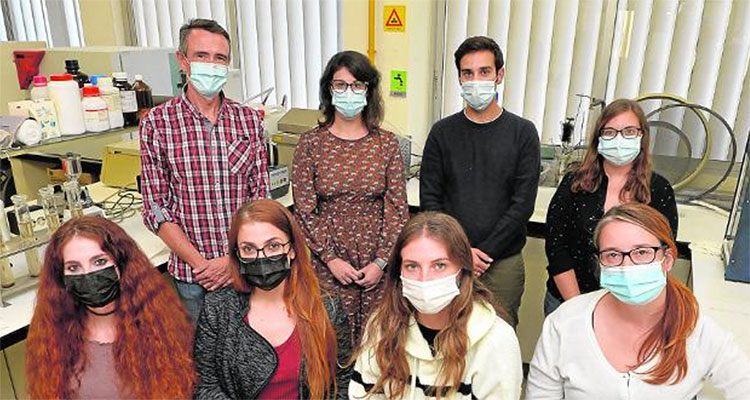
[Original article in Spanish]
01-05-2021
EASYTRAIN Project Coordinator Radio Interview - A vivir Tierra y Mar | Cadena Ser

Interview to Fco. Javier Sánchez Vázquez (University of Murcia), PI of the European Project Eco-Innovative Aquaculture System Training for European Industrial Doctorates (EASYTRAIN). Follow the "Read more" link to listen the interview from minute 40:57 to 49:32 (...)
[Original interview in Spanish].
23-04-2021
University of Murcia will train 6 Early Stage Researchers as future promises of sustainable aquaculture.
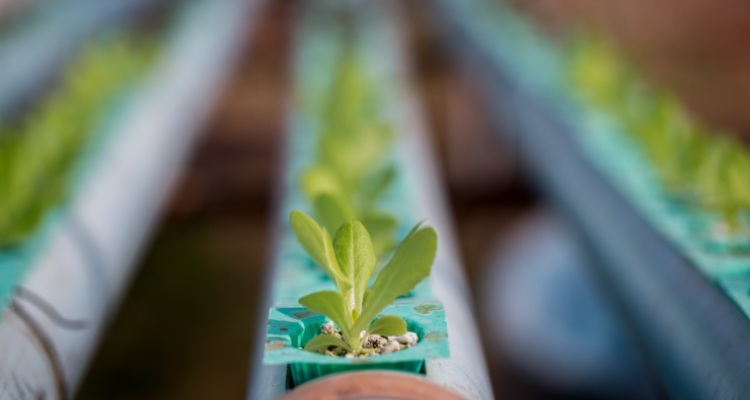
The European Project Eco-Innovative Aquaculture System Training for European Industrial Doctorates (EASYTRAIN), in which University of Murcia participates, will train 6 Early Stage Researchers to face the future challenges in the aquaculture sector. The selection process will open in a few days with the publication of the offers on the project website (...) [Original article in Spanish].
23-04-2021
The European Project EASYTRAIN will train 6 Early Stage Researchers to develop systems using aquaponics techniques.
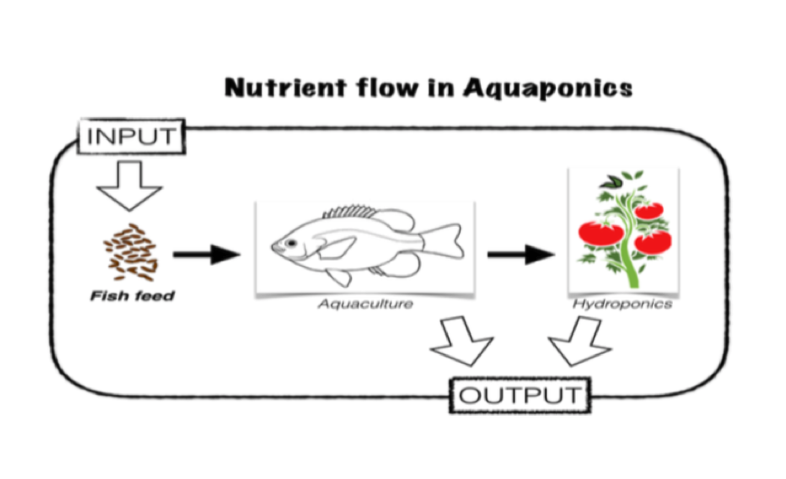
The EASYTRAIN project, which proposes the development of innovative, sustainable and economically profitable systems to face the current challenges of aquaculture through the training of young researchers, began on March 1st. (...) [Original article in Spanish].
22-04-2021
UMU coordinates the European Project EASYTRAIN to face current challenges in aquaculture.
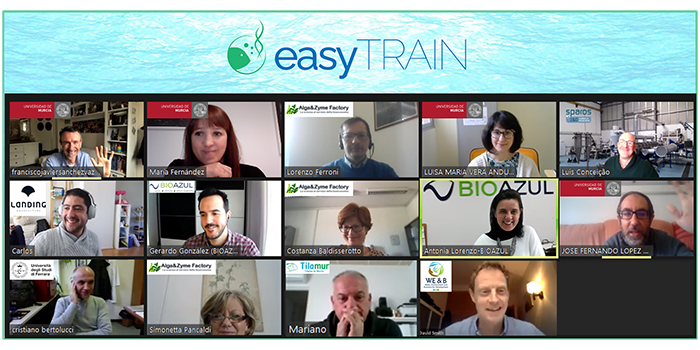
The EASYTRAIN project, which began on March 1st, proposes the development of innovative, sustainable and economically profitable systems to face the current challenges of aquaculture through the training of young researchers. Aquaculture is the food production sector that has grown the most in recent years. This represents 20% of the fish production in Europe (...) [Original article in Spanish].
